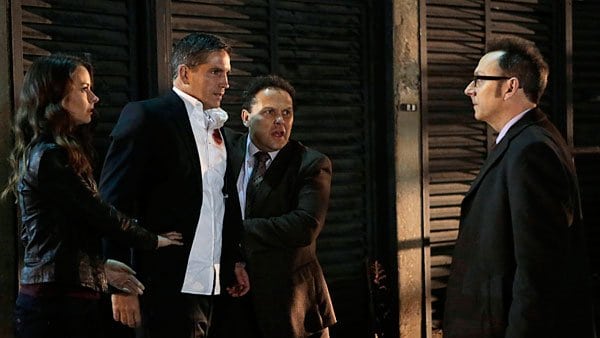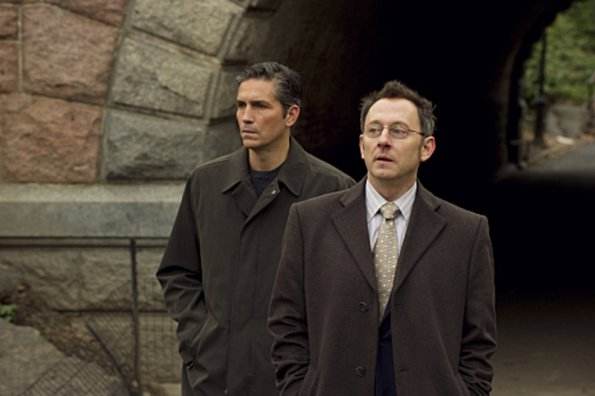
Television, like history books, is written from the perspective of the winners. No matter what the consequences of the story being told, the main cast will always come out victorious. They will always come away with the thing that they wanted, one way or another. Even Breaking Bad, [SPOILER] a show that ends with the death of its protagonist, only ended that way because he chose to end it that way.
The danger in writing from the winner’s circle is that you lose the perspective of the other end of the stick. How many times have we seen the heroes of a story come up against a faceless mass? Burn Notice, Angel, Lost: all up against enemies so vast and powerful that you scarcely regard them as real.
And, of course, that is the problem. Burn Notice belatedly tried to answer the question of the organization behind Michael’s firing, but they never could quite do much more than punt it down the road. Lost eventually drowned in it.
Angel, however, attacked the problem from a different perspective. They dedicated their fifth and final (and best) season to its heroes working as a part of the organization that they’d spent the better part of valor trying to burn down. All of the sudden, you realize that things aren’t so black and white, not so cut and dry; yes, they allowed a necromancer to do bad things but by doing so they both gained a powerful ally and kept worse things from happening. Is it worse to let a wetwork team kill a little boy with a bomb inside of him than to risk the safety of all of Los Angeles?
Tonight’s episode of Person of Interest was told from the perspective of the losers, or, at least, the villains. Control was the most prominent figure, and we got to see her as she is: complicated. She has been portrayed as an evil, scheming murderer of a human being. And she is. You cannot cut the into the head of another human being to make a point without being a little bit deranged. But at the same time, she believes in what she is doing. She isn’t sitting on a marble throne, drinking wine and cackling at the crack of every thunderbolt. Control knows how many people she’s killed; Control feels them acutely; Control doesn’t enjoy them. Control does what she does so that her country will be safe.
That complicates things. It paints our heroes in a different light. Every time Reese or Root or Sameen does something to screw up one of their operations, it potentially puts innocent lives at risk. It’s a nuisance, one amongst thousands, as she and Research do their best to protect the US from terrorist attacks. One of the plots in tonight’s episode dealt with a radical Muslim terrorist cell located in Detroit, but from the very beginning, something is off. It’s all too perfect; four Muslim men living in a house together, with no prior history of violence. One of them is even an American citizen, born and raised, and that gives Control pause. She starts to doubt Samaritan, but not enough to where she doesn’t kill the American-born “terrorist” when she manages to catch up with him.
But what Control is starting to understand (or, more accurately, face), is that Research is no longer Research. The Machine delivered relevant numbers, each and every time. There was no agenda behind The Machine’s machinations. But Samaritan? Samaritan is different. Samaritan was created by Greer because Greer believes the world needs a steady, firm hand to lead them; Greer believes that Samaritan will keep them safe. And he will. For a time. But Samaritan, unlike The Machine, is totally uninterested in protecting people except as a byproduct of its own rise to power. The stock exchange attack, the chaos it induced in New York, the brazen manipulation of the President’s Chief of Staff to gain a meeting with the POTUS; it’s making a point. It’s showing off. Worse, it’s having fun.
Control has killed 854 people in her quest to keep the country safe. I’m sure, if pressed, she could remember every name. But it’s one thing to sleep at night, knowing you did bad to do good, and another not knowing at all.
Team Machine didn’t have much screentime this episode. They spent the majority of it off-camera tearing apart New York in their quest to get to Control. We only see them through newsfeeds and lackey updates, which goes back to what I was saying before about seeing them in a different perspective. Team Machine is not as powerful as they appear, once you realize they are one (an important one, but still) of many.
I was glad, actually, that they didn’t have much screentime. It would’ve been cool to see them rampage across New York but it would’ve been pretty familiar. We’ve seen Reese burn people alive to find Carter’s killer; it’s not a new thing for us. Plus, learning about the inner conflicts of Samaritan v. Control was much more illuminating. I’m always happy when a show takes a different perspective, especially when it’s as nuanced as this one.
This episode ends the Person of Interest trilogy that began with a scheming little boy and ended with Root and Reese looking for Sameen. I don’t think Sameen Shaw is alive. I don’t see how she could be, or why. Best case scenario, she’s a trap, and they are falling right for it. But honestly, I don’t care, because I buy it. This episode was well-done, both in terms of creative content and from a craft’s perspective. Person of Interest has improved every season and tried new things; I can only imagine that will continue in the future.
Stray Thoughts:
– Control tells Travers, the Samaritan rep, to “Stop it. Now.” Later, when Samaritan sees that she is meddling, it sends her a text message with the same message, in the same cadence. It’s a little touch that really brings home how smart Samaritan is.
– Amy Acker is the best.
– Jim Caviezel does cold fury so frighteningly well.
– “You foolish woman. You don’t understand. You are in the dark. You’re the cleanup crew; you’re a janitor.” Harold Finch with the sick burns.
– Andy Callahan wrote this episode, and Stephen Surjik directed it. You can find them both on Twitter; please, go show them some love for the smart script and the tense directing.
[Photo via CBS]
 Follow Us
Follow Us




